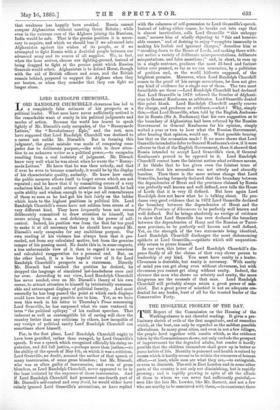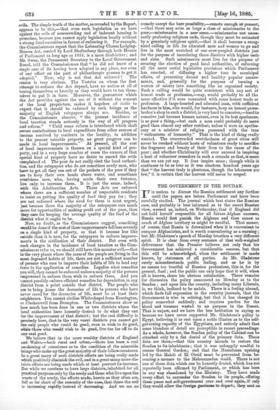THE INSOLUBLE PROBLEM OF THE DAY. T HE Report of the
Commission on the Housing of the Working-classes is not cheerful reading. It gives a preliminary sketch of evils of the first magnitude, and of remedies which, at the best, can only be regarded as the mildest possible alleviations. In many great cities, and even in not a few villagee, the people herd together with results which, as the evidence taken by the Commissioners shows, not only exclude the prospect of improvement for the degraded adults, but render it hardly possible that the children themselves shall grow up in better or purer habits of life. Morality is poisoned and health is ruined by causes which it hardly seems to be within the resources of human effort,—at least, while men are what they are,—to extinguish, or even to diminish. The evil in East London and in some other parts of the country is not only not diminishing, but is rapidly growing ; and is rapidly growing in spite of all the efforts of those to whom we can never feel sufficiently grateful,— men like the late Mr. Lowder, like Mr. Barnett, and not a few who are worthy to be associated with them,—to counteract these evils, The simple truth of the matter, as revealed bythe Report, appears to be this,—that even such legislation as we have against the evils of overcrowding and of indecent housing is powerless, because you cannot apply legislation locally without a strong local executive in favour of enforcing it. For example, the ,Gommissioners report that the Labouring Classes LodgingHouses Act, carried by Lord Shaftesbury through both Houses of Parliament as long ago as 1851, is a mere dead-letter ; and lafi. Owen, the Permanent Secretary to the Local Government Board,, told the Commissioners that "he did not know of a single case of its having been adopted in any place, nor even of any effort on the part of philanthropic persons to get it adopted." Now, why is not that Act enforced ? The reason is very obvious. The Vestries on whom the first attempt to enforce the Act depend, have no notion at all of taxing themselves so heavily as they would have to tax themselves to put it in force. Moreover, the guarantees which the Act provides against the use of it without the consent of the local, proprietors, makes it hopeless ab initio to expect, that it should be enforced by such beings as the majority, of English ratepayers always are. Besides, as the Commissioners observe, 6C the present incidence of local taxation stands seriously in the way of all progress and reform." "Until some reform is introduced which shall seer= contributions to local expenditure from other sources of ineome received by residents in the locality, in addition to the present rateable property, no great progress can be macle in local improvements." At present, all the cost of local improvements is thrown_ on a special kind of property, and in a very large number of cases the owners of that special kind of property have no desire to amend the evils complained of. The poor do not really elect the local authorities, and the ratepayers who do are sometimes needy men, who hare-,to get all they can out of the pockets of the poor if they are ta keep their own heads above water, and sometimes avaricious men, who, having made their own fortunes, live only to increase them. It is just the same, indeed, with the Adulteration Acts. Those Acts are enforced where there are a sufficient number of respectable residents to insist on getting the quality of food they pay for ; they are not enforced where the need for them is most urgent, just because there the majority of the ratepayers care much more for opportunities of making profit out of the poor, than they care for keeping. the average quality of the food of the district what it ought to be.
Nair, no doubt, as the Commissioners suggest, something Would be done if the cost of these improvements fell less severely on a single kind of property, so that it became less like suicide than it is now, for the ratepayers to enforce improvements in the civilisation of their district. Bat even with such changes in the incidence of local taxation as the Coramisaioners refer to, we should still have this monster evil,—that in the very places where the mass of the people are living in the most -degraded habits of life, there are not a sufficient number of persons who care to improve their habits of life to lend any force to the application of remedies. Legalise what remedies youlvill, they cannot be enforced unless a majority of the persons empowered to enforce them wish to enforce them. And you cannot possibly enforce efficient remedies for degradation in any district from a point outside that district. The people who am to bring kome the decencies of life to persons who have never cared for the decencies of life, must be at least their neighbours. You cannot civilise Whitechapel from Kensington, or Clerkenwell from Brompton. The Commissioners show us how much has been done in one or two districts where the local authorities havehonestly desired to do what they can for the improvement of that district ; but thereat difficulty is precisely here, that in the very worst districts you cannot get the only people who could do good, even to wish to do good, wiftle.those who woukl wish to do good, live too far off to do any--real good.
We believe that inthe more wealthy districts of England and Wales,—both rural and urban,—there has been a real awakening of conscience as to the condition of the miserable beings who make up the great majority of their fellow-oreatures. In a great many of such districts efforts are being really made which. poeitively diminish the evil, and in a great many more districts efforts are being made which at least prevent its increase. Butwhile we continue to have large districts, inhabited for all prnetital purposes only by the needy and those who live upon the wants of the needy, the efforts made, heroin as they often are, Intl so far short of the necessity of the case, that there the evil is increasing rapidly instead of decreasing. And we see no remedy except' the bare possibility,—remote enough at present, —that there may arise so large a class of missionaries to the poor,—missionasiet in a new sense,—missionaries net necessarily professing-religious ends, though they must be animated by a genuinely religions spirit,—that it shall become a recoge nised calling in life for educated men and women to go and. live in the most wretched of our over-peopled districts just for the purpose of inoculating those districts with higher ends and aims. Such missionaries must live for the purpose of' securing the election of good local authorities, of enforcing all the more useful legislative provisions which Parliament has enacted, of diffusing a higher tone in municipal affairs, of promoting decent and healthy popular amusements, and, generally for the purpose of turning a warren of misery into something like an organised society. Such a calling would be quite consistent with any sort of honest trade or profession,—nay, would probably be all the more effective if it were connected with some honest trade or profession. A large-hearted and educated man, with sufficient hardness in him., who would, for instance, keep an honest pawnbroker's shop in such a district, is very hard to conceive,—hard to conceive just because human nature, even in its best specimens, is so poor a thing,—but such a man could probably do moregood than almost any other resident, unless it were an apothis. carr or a minister of religion possessed with the true" enthusiasm of humanity." That is the kind of thing really' wanted. The overcrowded wretchedness of great cities will never be reached without hosts of volunteers ready to sacriffce the fragrance and beauty of their lives to the cause of the. poor; and whether Christianity will ever succeed in inspiringa host of volunteer crusaders' in such a crusade as that,is-more than. we can yet say. It does inspire some ; though while it continues to. be as true as-it was nineteen hundred years ago that the harvest truly is plenteous, though the labourers ars few," it is certainthat the harvest will never he reaped.



































 Previous page
Previous page